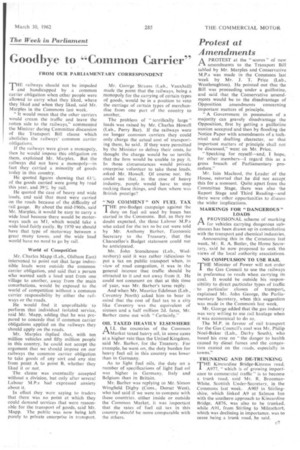Goodbye to "Common Carrier
Page 47

If you've noticed an error in this article please click here to report it so we can fix it.
FROM OUR PARLIAMENTARY CORRESPONDENT THE railways should not be impeded and handicapped by a common carrier obligation when other people were allowed to carry what they liked, where they liked and when they liked, said Mr. Marples in the Commons last week.
"it would mean that the other carriers would cream the traffic and leave the rotten side to the railways," commented the Minister during Committee discussion of the Transport Bill clause which abolishes the railways' common carrier obligations.
If the railways were given a monopoly, then he would impose this obligation on them, explained Mr. Marples, But the railways did not have a monopoly—in fact they carried a minority of goods today in this country.
He quoted figures showing that 61% of the goods carried were going by road this year, and .39% by rail.
He quoted the case of heavy and wide loads, and said that most were carried on the roads because of the difficulty of rail gauge. By about the mid-I960s, said Mr. Marples, it would be easy to carry a wide load because there would he motorways such as Ml, which would take a wide load fairly easily. By 1970 we should have that type of motorway between a great many towns. and the wide load would have no need to go by rail.
World of Competition Mr. Charles Mapp (Lab., Oldham East) intervened to point out that large indivisible loads were outside the common carrier obligation, and said that a person who wanted such a load sent from one village to another, away from the main conurbations, would be exposed to the world of competition Without a common carrier responsibility by either the railways or the roads.
He would find it unprofitable to perform that individual isolated service, said Mr. Mapp, adding that he was prepared to concede that if common carrier obligations applied on the railways they should apply on the roads.
Mr. Marples feplied that, with ten million vehicles and fifty million people in this country, he could not accept the argument that we should impose on our railways the common carrier obligation to take goods of any sort and any size from point A to point B, whether they liked it or not.
The clause was eventually accepted without a division, but only after several Labour M.P.s had expressed anxiety about it.
In effect they were saying to traders that there was no point at which they could demand services that were reasonable for the transport of goods. said MT. Mapp. The public was now being left purely to private enterprise in transport. Mr. George Strauss (Lab., Vauxhall) made the point that the railways, being a monopoly for the carrying of certain types of goods, would be in a position to veto the carriage of certain types of merchandise from one part of the country to another.
The problem i of " terrifically large" loads was raised by Mr. Charles Howell (Lab., Perry Bar). If the railways were no longer common carriers they could only charge the actual cost of transporting them, he said. If they were permitted by the Minister to defray their costs, he thought the charge would be so terrific that the firm would be unable to pay it. In those circumstances would private enterprise volunteer to take these loads, asked Mr. Howell. Of course not. He could see that, in the case of heavy industry, people would have to stop making these things, and then where was British prestige?
"NO COMMENT" ON FUEL TAX
T" pre-Budget campaign against the duty on fuel oil used by buses has started in the Commons. But, as they no doubt expected, the three Labour M.P.s who asked for the tax to be cut were told by Mr. Anthony Barber, Economic Secretary to the Treasury, that the Chancellor's Budget statement could not be anticipated.
Mr. John Stonehouse (Lab., Wednesbury) said it was rather ridiculous to put a tax on public transport when, in view of road congestion, it was in the general interest that traffic should he attracted to it and not away from it. He could not comment on that at this time of year, was Mr. Barber's terse reply.
And when Mr. Maurice Edelman (Lab., Coventry North) asked him to bear in mind that the cost of fuel tax to a city like Coventry was the equivalent of sixteen and a half million 2d. fares, Mr. Barber came out with "Certainly."
OIL TAXED HEAVILY EISEWHERE
ALL the countries of the Common ALL
taxed heavy oil, in some cases at a higher rate than the United Kingdom, said Mr. Barber, for the Treasury. For example, he went on, the duty burden for heavy fuel oil in this country was lower than in Germany.
As to light fuel oils, the duty on a number of specifications of light fuel oil was higher in Germany, Italy and Belgium than in Britain.
Mr. Barber was replying to Mr. Simon Wingfield Digby (Cons., Dorset West), who had said if we were to compete with these countries, either inside or outside the Common Market, it was important that the rates of fuel oil tax in this country should be more comparable with the others.
































































































































